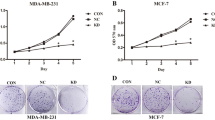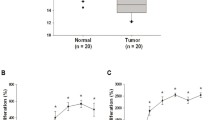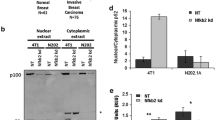Abstract
Objective
FHL2 was previously identified to be a novel interacting factor of Id family proteins. The aim of this study was to investigate, the effects of FHL2 on Id1-mediated transcriptional regulation activity and its oncogenic activity in human breast cancer cells.
Methods
Cell transfection was performed by Superfect reagent. Id1 stably overexpressed MCF-7 cells was cloned by G418 screening. The protein level of Id1 was detected by western blot analysis. Dual relative luciferase assays were used to measure the effect of E47-mediated transcriptional activity in MCF-7 human breast cancer cells. MTT assay was used to measure cell proliferation. Transwell assay was used to measure the invasive capacity of MCF-7 cancer cells.
Results
The basic helix-loop-helix (bHLH) factor E47-mediated transcription activity was markedly repressed by Id1 in MCF-7 cells. This Id1-mediated repression was effectively antagonized by FHL2 transduction. Overexpression of Id1 markedly promoted the proliferation rate and invasive capacity of MCF-7 cells; however, these effects induced by Id1 were significantly suppressed by overexpression of FHL2 in cells.
Conclusion
FHL2 can inhibit the proliferation and invasiveness of human breast cancer cells by repressing the functional activity of Id1. These findings provide the basis for further investigating the functional roles of FHL2-Id1 signaling in the carcinogenesis and development of human breast cancer.
Similar content being viewed by others
References
Massari ME, Murre C. Helix-loop-helix proteins: regulators of transcription in eucaryotic organisms[J]. Mol Cell Biol 2000; 20:429–440.
Norton JD, Deed RW, Craggs G, et al. Id helix-loop-helix proteins in cell growth and differentiation[J]. Trends Cell Biol 1998; 8: 58–65.
Atchley WR, Fitch WM. A natural classification of the basic helix-loop-helix class of transcription factors[J]. Proc Natl Acad Sci USA 1997; 94: 5172–5176.
Langlands K, Yin X, Anand G, et al. Differential interactions of Id proteins with basic helix- loop-helix transcription factors[J]. J Biol Chem 1997; 272:19785–19793.
Perk J, Iavarone A, Benezra R. Id family of helix-loop-helix proteins in cancer[J]. Nat Rev Cancer 2005; 5:603–614.
Ruzinova MB, Benezra R. Id proteins in development, cell cycle and cancer[J]. Trends Cell Biol 2003; 13:410–418.
Lin CQ, Singh J, Murata K, et al. A role for Id-1 in the aggressive phenotype and steroid hormone response of human breast cancer cells[J]. Cancer Res 2000; 60:1332–1340.
Gupta GP, Perk J, Acharyya S, et al. ID genes mediate tumor reinitiation during breast cancer lung metastasis[J]. Proc Natl Acad Sci USA 2007; 104:19506–19511.
Johannessen M, Møller S, Hansen T, et al. The multifunctional roles of the four-and-a-half-LIM only protein FHL2[J]. Cell Mol Life Sci 2006; 63:268–284.
Kleiber K, Strebhardt K, Martin BT. The biological relevance of FHL2 in tumor cells and its role as a putative cancer target[J]. Anticancer Res 2007; 27:55–61.
Gabriel B, Fischer DC, Orlowska-Volk M, et al. Expression of the transcriptional coregulator FHL2 in human breast cancer: a clinicopathologic study[J]. J Soc Gynecol Investig 2006; 13: 69–75.
Martin BT, Kleiber K, Wixler V, et al. FHL2 regulates cell cycle-dependent and doxorubicin-induced p21Cip1/Waf1 expression in breast cancer cells[J]. Cell Cycle 2007; 15:1779–1788.
Han W, Wu Z, Zhao Y, et al. FHL2 interacts with and acts as a functional repressor of Id2 in human neuroblastoma cells[J]. Nucleic Acids Res 2009; 37:3996–4009.
Yang J, Zhao YL, Wu ZQ, et al. The single-macro domain protein LRP16 is an essential cofactor of androgen receptor[J]. Endocr Relat Cancer 2009; 16:139–153.
Meng Y, Gu C, Wu Z, et al. Id2 promotes the invasive growth of MCF-7 and SKOV-3 cells by a novel mechanism independent of dimerization to basic helix-loop-helix factors[J]. BMC Cancer 2009; 9:75.
Hendrix MJ, Seftor EA, Seftor RE, et al. A simple quantitative assay for studying the invasive potential of high and low human metastatic variants[J]. Cancer Lett 1987; 38:137–147.
Author information
Authors and Affiliations
Corresponding author
Additional information
This work was supported by the National Natural Science Foundation of China (No.30870507) and partially supported by a grant from the Ministry of Science and Technology of China (No.2010CB912802).
Rights and permissions
About this article
Cite this article
Han, Wd., Wu, Zq., Zhao, Yl. et al. FHL2 antagonizes Id1-promoted proliferation and invasive capacity of human MCF-7 breast cancer cells. Chin. J. Cancer Res. 22, 194–200 (2010). https://doi.org/10.1007/s11670-010-0194-5
Received:
Accepted:
Published:
Issue Date:
DOI: https://doi.org/10.1007/s11670-010-0194-5




